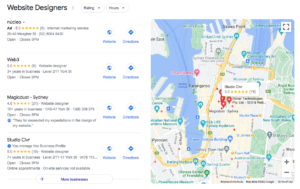Opportunities to increase Google ranking thanks to the 2024 leak
Table of Contents

Digital marketers have been revelling in the Google algorithm leak from May 2024. Here’s what happened. An automated internet robot called yoshi-code-bot leaked over 2,500 documents detailing the 14,000 attributes the Google algorithm uses to rank websites and display them in search results. Google has been very closely guarding this information, so all of my web forums seriously blew up in incredulous response to the leak.
Key findings on Google algorithm factors
 I’ve spent time in June trawling through the data and through the analysis made by the folks at Search Engine Land and iPullRank to unravel just what this means for my business, and how my clients can use these nuggets of pure gold to improve their own search game. I won’t cover everything—all 14,000 attributes would make for boring reading, and many of these aren’t relevant to the service-based businesses we work with here at Studio Clvr. I’ve ignored the obvious indicators like the presence of porn, which isn’t something we generally have to think about when helping businesses build an authority online via a professional website. Having said that, if your site is hacked and redirected to porn, the negative effects on your SEO will likely be devastating. That’s why we always recommend high quality website hosting via our website care plans.
I’ve spent time in June trawling through the data and through the analysis made by the folks at Search Engine Land and iPullRank to unravel just what this means for my business, and how my clients can use these nuggets of pure gold to improve their own search game. I won’t cover everything—all 14,000 attributes would make for boring reading, and many of these aren’t relevant to the service-based businesses we work with here at Studio Clvr. I’ve ignored the obvious indicators like the presence of porn, which isn’t something we generally have to think about when helping businesses build an authority online via a professional website. Having said that, if your site is hacked and redirected to porn, the negative effects on your SEO will likely be devastating. That’s why we always recommend high quality website hosting via our website care plans.
The most interesting thing about the various evaluations of this data leak, is that it has me changing me mind on some of my practices. This includes weighing up the importance of some of my ethics — i.e. data privacy and my position on not collecting visitor data vs search visibility to get more traffic, more leads and more clients. Ethics are great, but we’re all in this game for our businesses to thrive, and if an ethical choice gets in the way of lead visibility, then it’s worth a good hard think about that choice — like everything, some choices are things we can live with (or just accept as the reality of the world we’re in), and others will be a clearer no go zone. I can still choose not to collect or store some data from website visitors, while accepting that collecting the data that Google needs for Analytics to function and to ensure the algorithm is ranking my website just may well be a business necessity.
Another point to make is that there has been no big revelation around how each of these ranking factors are weighted. Some factors will be more important to others and that continues to be a constant expierment by SEOers to get the right balance for your business and your content. That’s another reason why SEO isn’t a task that can be done once and forgotten. Ranking in search results takes ongoing effort to create fresh content, regular keyword research and content optimisation, and experimentation, measurement and iteration to maximise what’s moving the needle for your business.
The main positive indicators that increase ranking on Google
Domain Authority
Domain Authority was developed as a presumptive ranking factor by SEO company Moz. For years, Google has rejected the notion that domain authority even exists. The leak proves Moz is right on this score.
Domain authority is a score given to your website based on a whole bunch of factors to indicate the overall authority of your website. How you rank in search for individual pages or posts on your site will be determined by your domain authority and how your authority measures against the competitors for the same search term. If your business is considered more trustworthy to Google, your content is more likely to be served up to a searcher.
The main tactics to improve your domain authority include:
- Post regular new content. This basically tells Google that you are still operating and that your information is up-to-date and not old and musty.
- Post content that is highly relevant to your business. So as a web design and marketing business, if I suddenly start posting recipes, that will decrease my domain authority.
- Use content clusters and keywords that are relevant to your business. This isn’t a direct correlation with domain authority, but trial and error with my clients have shown me that using this approach does help to increase domain authority scores faster than posting without consideration for a well-thought-out content plan or keyword strategy. The success of this approach could also be that in having developed a clear strategy around your content, you are naturally more authoritative because every piece of content you publish has a clear purpose, fits as part of a greater whole to build that sense of expertise and authority.
Your Home page is everything
 Every other page or post on your website is given a value based on how much Google trusts your Home page. This again, is a direct reference to the relevance of Domain Authority and is a clear indication that your Home page really is everything.
Every other page or post on your website is given a value based on how much Google trusts your Home page. This again, is a direct reference to the relevance of Domain Authority and is a clear indication that your Home page really is everything.
Your Home page content needs to clearly display who you are, who you serve, your unique value proposition, what services you offer and social trust indicators to verify your authority. Your Home page is the hub for your entire website. While you don’t need to advertise every single service you offer on your Home page, your Home page does need to be a highly relevant reflection of what makes you you and why you matter and should be trusted. Getting this right helps to determine the rank potential of every other page or post you publish.
Click through rate
Click-through rate (CTR) is another factor that Google has previously denied as a ranking factor. The leak clearly reveals the validity of CTR, showing that Google uses this to determine context for a search term, i.e. if people are searching for ‘apple’ and clicking on a link for iPhones, CTR helps the algorithm learn that the context most users are looking for is the business and not the fruit.
To use this for your business, you’ll want to think about how closely your website content answers the search intent of your target market. Do your research on what your audience is searching for, write content that directly solves their problem, and you’ll be winning. If your website is getting clicks, it’s an indication that you are likely answering a search query in a way that is relevant to what the searcher is looking for.
This is another indicator that answering questions your audience has gives great relevant content on your website. Trawl that email inbox for all the advice you’ve given and start turning it into relevant blog posts!
Google loves Google
 I’ve said this for years, but while I’ve always been a big advocate for using Google Business Profile and collecting reviews, I have completely neglected using Google Analytics and Chrome in favour of more privacy-friendly alternatives (Fathom Analytics and Brave). This is a scenario where my ethical preference not to stalk people around the internet is now in conflict with the cold hard facts of this data, which says that Google uses clicks from it’s own Chrome browser to get analytics from websites like mine where Google Analytics is not currently installed.
I’ve said this for years, but while I’ve always been a big advocate for using Google Business Profile and collecting reviews, I have completely neglected using Google Analytics and Chrome in favour of more privacy-friendly alternatives (Fathom Analytics and Brave). This is a scenario where my ethical preference not to stalk people around the internet is now in conflict with the cold hard facts of this data, which says that Google uses clicks from it’s own Chrome browser to get analytics from websites like mine where Google Analytics is not currently installed.
Of course, Chrome doesn’t give the full picture of my analytics, currently only Fathom is doing that (while respecting my users private data), but the data is still being gathered via the browser and just maybe, using Google Analytics actually helps Google understand your website better and will in turn rank you higher as a result of this deeper understanding of your authority.
Time on site
Earlier this year, Google let us know that Bounce Rate (when a user clicks on your site but immediately leaves) is no longer a ranking factor. This is kind of a good thing, as it means that people who click but aren’t quality leads for your business immediately know that your site isn’t for them—well, that or something is wrong with your site that’s making them leave before they find out, but that’s another problem!
The longer a visitor is on your website after clicking on a search result, the higher Google ranks you for that relevancy score. We don’t know the exact weighting of this, but if you keep visitors hanging around on your website, this is a really strong indicator to Google that you are meeting search intent with quality content and are trusted to answer the search question.
This, in turn, also increases your domain authority.
Last click attribution
The more time that passes since your content was last clicked, the ‘older’ and less authoritative your content becomes in the eyes of Google. That’s why it’s a great idea to continually update your content — evergreen/state-of-the-union style content that can be updated annually is an easy win. Fresh content shows Google that you’re up-to-date and you know what you’re talking about.
I’m the first to admit that I’m constantly failing at this. I know I’m up-to-date in my knowledge, because I’m applying it in my daily practice and am a constant learner. But I’m not taking the time to share that knowledge, and that’s really significant.
Links
Building a strong link profile continues to be an important factor and definitely seems to have a strong correlation with domain authority and a boost in search rank.
Key points on links:
- The newer the link, the higher quality it is considered to be—’freshness’ is, again, an indicator of quality here.
- UI design should include a highlight value to emphasise the link — i.e. bold text and underline links for emphasis.
- Links from sites with high domain authority are still great. Getting these links can be difficult without a dedicated digital PR professional, but can be done if you have relationships you can leverage. Key tip: use your networks!
- Spam: as always, you don’t want to be a spammy using spammy links and you don’t want spammers linking to you. A regular audit of your spam score and clean up in Google Search Console can be helpful to turn a negative spam score around.
Video
 Using video on your website has been seen to improve search rankings for quite some time. This has largely been though to be because adding videos increases the time a visitor stays on your website and because others are more likely to link to video content, therefore giving your website more backlinks.
Using video on your website has been seen to improve search rankings for quite some time. This has largely been though to be because adding videos increases the time a visitor stays on your website and because others are more likely to link to video content, therefore giving your website more backlinks.
What the data from the May 2024 algorithm leaks tells us is that Google is specifically tagging sites with videos on more than 50% of site pages as a ‘Video-Focused Site’. The data leak does not tell us if this tag positively or negatively affects page or site rankings, but I think given the success seen by websites using video on the regular, we can assume that getting this tag will help to promote your website.
What are some easy wins for video? Highly polished, studio videos obviously look great and are brilliant for your brand. But I’m also of the opinion that with a decent mic, ring light and simple recording software, most small businesses can easily create videos to enhance or introduce your content. This is something we can all get better at with a process and a bit of practice.
Dates
Google is looking at various uses of dates in your content and marrying that up to determine how new and relevant your content is. There are 3 date types that Google is looking at:
- Byline date: this is the date of publication or updated date that appears in the content byline and which would be included (when implemented) in your article schema. If you’re getting this right, your content is more likely to appear in a search snippet because of the presence of the date.
- Syntactic date: this is a date that you may include in the title or url.
- Semantic date: this means you talking about the date in your content. In this article, I talk about the Google algorithm leak in May 2024. That’s semantic use of the date.
BUT if the dates you use here don’t all match each other, you could be negatively ranked for the mismatch. So I wouldn’t focus on this too much. Just keep publishing fresh content and you’ll be sweet.
Display your authors
A lot of small business actively avoid publishing the author of an article. Often this starts because the business owner is not the writer, the writer is an office junior. I get it. But with AI everywhere, displaying the author on your blog posts will help to show Google that your content has been written by a real human. Google likes that.
The main negative indicators that contribute to Google demotions
On-topic content
Google is comparing your individual page to the rest of your website to measure how on-topic it is. As a web designer and digital marketer all of my content should be relevant to that industry. If I suddenly start publishing recipes, this will send a flag to Google that my new content is irrelevant and should be demoted.
This is true of links too: if your anchor link says it’s going to an article on wellness, don’t send folks to a product page selling stuff. Keep everything on-topic and a direct match to what you say you are writing about.
Links that don’t have context
This is all about accessibility. ‘Read more’ gives the user zero indication of where they are going. Sure, the context around the link may well give enough information for most website visitors to understand where the link is going. But take a step back and consider how that link comes across when read aloud by a screen reader. Or when read by a machine-learning robot like the Google algorithm. Suddenly all context is lost. Changing your link to ‘Read more about our services’ (assuming the page you are linking to is your services page) provides information about where the link is taking the user. If you can’t use context in the link itself, add it to an aria-label (this is technical detail that can be added as an attribute to your buttons and links, I’ll dive deeper into these accessibility data points another time!).
Location
 This is actually huge and another reason why all businesses should be on Google My Business with a Google Maps listing. As a starting point, get an address up on your website. Google likes to know where you are to know if your business is relevant to a search and to verify that you have a location in the real world as a trust factor.
This is actually huge and another reason why all businesses should be on Google My Business with a Google Maps listing. As a starting point, get an address up on your website. Google likes to know where you are to know if your business is relevant to a search and to verify that you have a location in the real world as a trust factor.
I know a lot of small businesses don’t like to list location, but it’s becoming increasingly important to do it.
Poor design: user experience (UX) and user interaction (UI)
User experience is all about ensuring that people can easily navigate your website and find what they’re looking for, fast. Get this wrong, and not only will you lose the visitor, but Google will hate it too.
Specifically, Google is demoting pages with poor navigation that make it difficult for users to find what they are looking for.
User interaction is all about the items on your website that users click on and interact with—buttons, forms,
Websites that clearly take users on a journey through their content, making the next click an easy action to take, are rewarded with time-on-site and domain authority boosts. Getting this right isn’t just an investment in SEO—it’s an investment in your business. Professional user experience and user interaction design make it easier for website visitors to become paying clients—that’s a no-brainer for enhancing revenue.
Crawl history
This one was a truly lightbulb moment for me. Google saves a historical record of your website pages and posts and uses that history to determine rank. This is huge news for me because, as many of you know, I rebranded my business in 2020. Although I know I have not been following my own advice and doing all the things I should be, four years on, my search rank and domain authority have not yet recovered to the higher standing I once had. In some ways this has been good — my business has changed substantially and I just didn’t want to be doing a lot of the work I was doing before. So, I’m not getting all the wrong leads I was getting before the rebrand. My lead conversion rate has increased because the leads I do get are inherently more qualified and likely to become clients. But, my authority ranking is still down, as is my traffic.
This helps explain it. Knowing that Google keeps a 20-page history of each page, what that seems to mean is that if you change a page 20 times, you will eventually wipe your old history. True, 20 sounds like a lot. But it’s totally do-able, and that experiment starts right now. I’ll report back when I have some direct results to report!
Obvious plagiarism/AI
 Short-form content is demoted if it isn’t original. This is probably in response to AI-generated content. There are already loads of quickly generated, likely plagiarised, short articles on the internet, most of which are clearly AI drivel.
Short-form content is demoted if it isn’t original. This is probably in response to AI-generated content. There are already loads of quickly generated, likely plagiarised, short articles on the internet, most of which are clearly AI drivel.
This is not 100% clear yet, but this could be an indication that Google will soon actively filter out all AI-generated content. Long-form content is not included in the originality demotion, so avoids this, probably because it’s so long that Google assumes longer content must be human-generated.
The main learning here is that AI can be awesome for ideas and to help speed up the writing process (I still use it to help me with headings to target SEO keywords), but your knowledge, your voice and your opinion are what carry weight for your domain authority and the ranking capability of specific content.
Website size
One of the attributes Google is using to rank sites is called ‘Small Personal Site’. There’s no indication of whether this attribution is positive or negative, but a lot of small businesses took a ranking hit in the August 2022 helpful content update. That update was supposed to negatively rank obviously SEO-targeted content in favour of content simply made by humans, for humans to be helpful.
Incidentally, I’m a firm believer that being helpful is the easiest way to do business, and that SEO is simply a tool you can use to help more people. Writing content specifically for SEO always falls flat.
That being said, the 2022 update definitely saw a lot of small businesses take a hit. With this new information about Small Business Website’ being an attribution that can be assigned to a website, then maybe website size was the cause of the hit to those users, rather than the quality of their content.
Obviously, content quality is still hugely important, but in my experience, most small businesses struggle to write regularly. I’m the first to put my hand up on that score! I’ve got a university degree in writing, so while I don’t write as consistently as I’d like, I know that when I do I write well. Aside from my clients who are copywriters or those who have a team large enough to have a pro copywriter on staff, it can be really hard for a small business with another field of expertise to suddenly pull out copywriting as an extra competency.
This attribute could be an indication that regularly publishing new content will grow your website to ensure that your business does not cop a possible demerit from the ‘Small Personal Site’ tag.
Getting Google right is about being human and showing up
 The main points all of this keeps coming back to is that to succeed in search, your business needs to:
The main points all of this keeps coming back to is that to succeed in search, your business needs to:
- Produce regular content: written, video or ideally both in combination.
- Produce original content: use AI to get your outline or help speed you up to bypass the blank page procrastination stage of the writing process. But don’t rely on AI to pump out truly useful content. To be original, your fingerprints need to be all over the finished copy. Your article should speak directly about what you do (be on-topic), speak to your audience (be helpful), and have an opinion (be authoritative).
- Reguarly audit your website for user experience, user interaction and content strategy to ensure that your Home page is serving it’s purpose, your site visitors are on an intuitive journey and your old content is churned into new content relevant to what you’re doing now and where you’re going.
This data leak is a gift for every business owner and small businesses can really take advantage of the knowledge to improve their website rankings. As it happens, I truly believe that getting this stuff right is also good for business — your Home page, your content and your site design is key to building value in your business, growing your authority and helping more people with your unique expertise.




